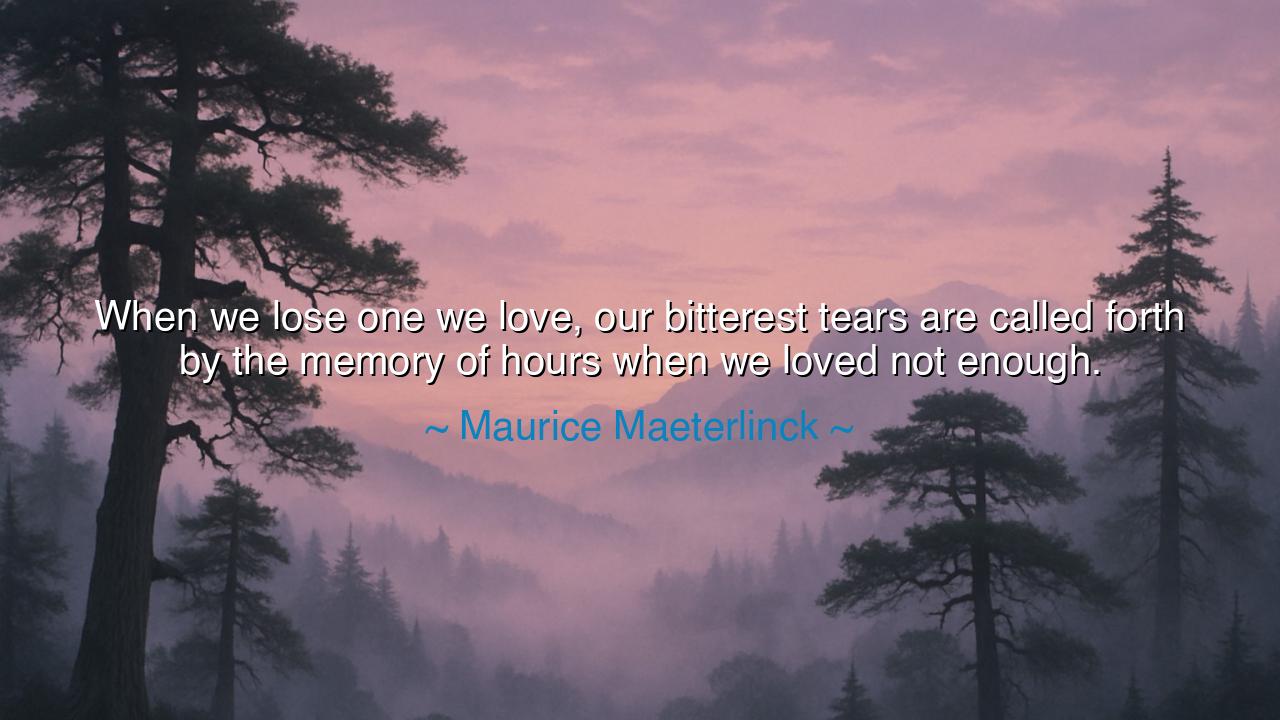
When we lose one we love, our bitterest tears are called forth by
When we lose one we love, our bitterest tears are called forth by the memory of hours when we loved not enough.






"When we lose one we love, our bitterest tears are called forth by the memory of hours when we loved not enough." These words by Maurice Maeterlinck cut deep, like a sword that strikes at the heart of the human condition. In these few lines, the essence of loss is revealed—not merely the absence of the loved one, but the profound grief that arises from the awareness of what was left unsaid, what was not given, and what was not cherished in the moments that passed. For in those final hours, when the loved one slips away, it is not the distance of time or space that pains us most, but the memory of neglect—the regret that we did not love with the fullness our hearts were capable of.
In the days of the great sages, the wise men and women often spoke of the ephemeral nature of life. They taught that the bonds we share with those we love are not to be taken for granted, for they are fragile as the petals of a rose. How many, in their youth, squander their days, caught up in the fleeting concerns of wealth, power, and vanity, only to realize too late that the true treasure was the time spent with those they loved? Love, the wisest taught, must be expressed in every moment, for we never know when the hour will come when we can no longer speak our affections or show our devotion.
Consider, if you will, the story of Alexander the Great, whose empire stretched from the shores of Greece to the heart of India. In all his conquests, he achieved greatness, but it is said that in his final days, he wept not for the empire he had built, but for the friendships he had neglected, for the love he had not given to those closest to him. Alexander's tears, like those of many before and after him, were not born of the death of an empire, but of the realization that in the pursuit of greatness, he had left behind the most precious of treasures—the love of those around him. This is the truth that Maeterlinck speaks of: when we lose one we love, it is not the absence of the loved one that brings the deepest sorrow, but the haunting knowledge that in our hours together, we did not love enough.
And so, love becomes the key that unlocks the door to our deepest regrets. For we are creatures of fleeting moments, and in the whirlwind of our lives, it is all too easy to take those closest to us for granted. We think we have all the time in the world to express our love, to show our devotion, to offer our hearts. But time, like the river, moves relentlessly forward, and we are left with nothing but memories when those moments are gone. The bitterest tears are shed not for the loss itself, but for the realization that we did not seize the opportunity to love fully, to cherish each passing hour as if it were the last.
Think of the story of Dante Alighieri, the great poet who wrote of his eternal love for Beatrice, a love that transcended even death. Beatrice passed from this world before Dante had fully realized the depth of his feelings for her. Though his poetry immortalized her, Dante’s heart was weighed down with the sorrow of missed opportunities—those moments when he could have expressed his love more deeply, more passionately, when he could have truly shown her the depth of his heart. It was not the loss of her presence that tormented him most, but the knowledge that he had loved her not enough while she was still with him. Dante's tears, like all of ours in such moments, were born from regret, from the unspoken words and the unlived moments of love that could never be reclaimed.
O children of the earth, heed this wisdom: do not wait. Do not wait for tomorrow to express your love, for tomorrow may never come. Let your words be tender and your actions filled with compassion, for there is no greater gift than to love fully and without hesitation. In every moment, whether with family, friends, or lovers, give of your heart generously, for once that moment is gone, it can never be returned. When the one you love is no longer by your side, it is not the time that has passed that brings the greatest sorrow, but the memory of hours not filled with enough love.
So I say to you, O seekers of wisdom, love fully, love deeply, love without reserve. Do not allow your heart to hold back, for in doing so, you rob both yourself and the one you cherish of the greatest treasure life has to offer. Let your actions speak louder than your words, and let every moment with those you love be a testament to the power of unspoken affection and unshakable devotion. Only then will you find peace, knowing that when the hour of parting comes, it will not be regret that fills your heart, but the joy of having loved fully in each precious moment.






AAdministratorAdministrator
Welcome, honored guests. Please leave a comment, we will respond soon